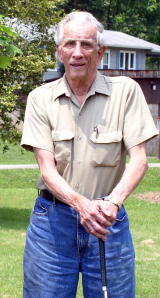REMEMBERING: WWII VET JIM GARRETSON GAVE YEARS OF SERVICE TO CAREER CENTER
 Calhoun's James M. Garretson died in Feb. 2012 at the age of 90, a story written about him in 1998:
Calhoun's James M. Garretson died in Feb. 2012 at the age of 90, a story written about him in 1998:By Theodore Webb, Parkersburg Sentinel Editor
James Garretson is "hard of hearing."
However, this obstacle has not kept 76 year old Garretson from serving his country in World War II, nor his disability prevented him from giving over 20 years of service to his community as a postal mail carrier and custodian at the Calhoun-Gilmer Career Center.
Garretson's life began on August 13, 1921. He was born to Oscar and Dolly Garretson in the middle of Grantsville in Calhoun County on Mill Street. When Garretson was about 5 years old, his parents discovered that he had a hearing problem.
"I had suffered a bout of scarlet fever," Garretson explains. "But, I think my hearing loss was probably hereditary. Both of my daughters have hearing problems."
Throughout his life, Garretson would never hear like other people.
Though not completely deaf, the young Garretson could not hear low sounds. As a child, he learned how to read other people's lips.
Like others of his generation, Garretson came of age during the profound economic depression of the 1930s.
"During the Depression, we had plenty to eat because we kept a garden," remembers Garretson. "But, we had to wear all our clothes as long as possible, usually till they wore out."
It was during the Great Depression that Garretson completed studies at Grantsville Grade School before graduating from Calhoun County High School in 1940.
"Those were good old days," Garretson was called to service in World War II. "When the doctors gave me my physical, they didn't realize that I was nearly deaf."
Garretson elaborates, "I could speak and read lips, so I was able to answer their questions. If I hadn't wanted to go to the war, I probably could have gotten out of it."
After being called away from his Calhoun County home, Garretson spent a week in Fort Knox, Kentucky and completed his basic training in Cheyenne, Wyoming.
He then went to a "staging area" in South Carolina and rode a train across the continent to California where he was "shipped out."
"We rode to war on a giant ship," says Garretson." About 10,000 men rode over on bunks four men high. We went through New Zealand, Australia, and Bombay, India to North Africa. The whole trip took 42 days."
Garretson's group took the Suez Canal to Alexandria, Egypt where they joined the British English Army. During the war, Garretson handled ordinance for the Army Air Corps, the forerunner of the modern U.S. Air Force. From Egypt, Garretson's unit went to Libya, Tunisia, Corsica, and Italy.
"At one point we were stationed in Pompei," says Garretson. "I was on guard duty when Mt. Vesuvius erupted. The volcano covered all of our tents, trucks, and equipment with three feet of ash. It looked like the end of the world."
Another harrowing experience exploded when the Germans bombed Garretson's unit at about 2:00 a.m. in May 1944.
"We were in Corsica at the time." Garretson relates. "The allies were ready to march to Berlin. We all thought the war was over." According to Garretson, the bombing raid wiped out every plane on the field. "We hadn't dug foxholes," Garretson recalls vividly.
"All we could do was lay flat on the ground and hope we wouldn't be killed."
"It was a different age then," Garretson says of the war. "We were all young. We all felt like we were doing something important to sign up for battle, patriotic I guess. I remember in grade school we would salute the flag and say the pledge of allegiance every morning before class."
After the war in Europe ended Garretson was shipped back to the United States where his poor hearing was finally considered by the army.
"The doctor giving me the physical asked me how in the hell I got in the war." Garretson quips, "I told him I just got on the boat and followed the rest of the boys."